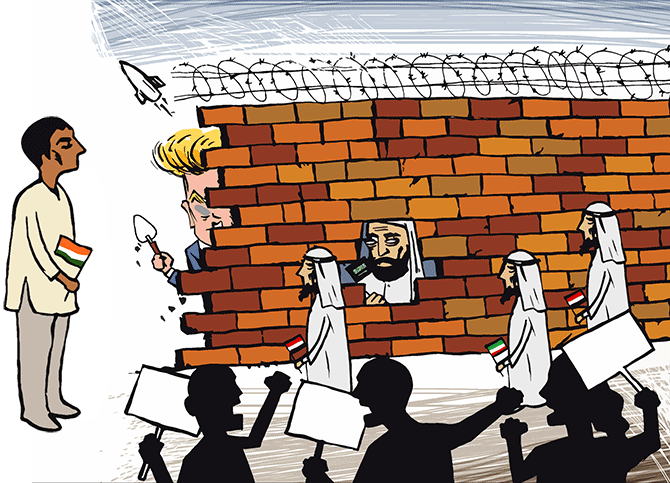'It will be a fine day when we can claim to have institutions in civil society as influential and as popular as ACLU, which is a strong body only because millions of Americans support its values.'
'When Indians take offence at how other Indians are treated, when we take injustice to others personally, we will begin to make India great,' says Aakar Patel.
Illustration: Dominic Xavier/Rediff.com

Many Americans felt offended by an order of their new president banning immigrants from seven nations.
Donald Trump had made a campaign promise to end terrorism by stopping the entry of Muslims coming into the United States. He said this ban would remain till he could 'figure out what's going on'.
On taking office, President Trump put in force this ban on nations which included Iran, a country whose population has relationships with lakhs of Iranian-Americans, and Iraq, many of whose citizens took America's side in a war against their own countrymen.
The list also included Syria, where violence is forcing millions to flee.
The Trump order did not seem to have been properly vetted by experts and initially covered those individuals who were citizens of those seven nations but held permanent residency rights in the United States (what is called a 'green card').
And the ban also extended to all those citizens from these nations who held valid tourst and business visas for America, causing chaos at airports.
It was noticed that the ban did not cover nations with which Trump had business interests, like Saudi Arabia (whose citizens had actually participated in the 9/11 attacks).
But more than the hypocrisy and the casual manner of the ban, offense was taken by many Americans at the fact that civil liberties and human rights were being violated.
Many Americans take seriously the idea of their country as being a nation of laws, and one that is free and equal.
These individuals felt they should act, and they did so by supporting the American Civil LIberties Union.
ACLU describes itself as a 'nonprofit, nonpartisan, legal and advocacy organization devoted to protecting the rights of everyone in America.' On its Web site it gives the rationale for its action since the Trump order with these simple words: 'He discriminated. We sued.'
A judge put a stay on the Trump order and several other lawsuits will make it difficult for him to enforce it.
Already some of the things, for example the ban on green card holders, have been rolled back because of spirited opposition.
It is at times like this that America benefits from having robust NGO institutions that have wide public backing in terms of media support and volunteer and financial support.
Within a few days of their lawsuit against the Trump order, ACLU raised over Rs 150 crore. This money came mostly in the form of small contributions.
Like the organisation that I work for, ACLU raises most of its money from monthly contributions from members.
Because of anger at the so-called Muslim ban, many celebrities offered to match donations made to ACLU by other people.
If 200 people donated a total of Rs 10 lakh, then the celebrity would add their own 10 lakh so that ACLU got Rs 20 lakh.
Other people decided to help increase the number of people following ACLU on Twitter and raise their following to 10 lakh.
Two lakh followers were added in a week and by the time you read this it is likely the number will cross ten lakh.
Many Americans felt that Trump's ban was similar to an event in the 1940s.
During the Second World War, the Japanese attacked Pearl Harbour, an American naval base in Hawaii. Following this, thousands of American citizens of Japanese origin were rounded up and jailed in internment camps, suspected of being traitors.
This became a matter of national shame later.
It is the memory of such historic wrongs, and the acknowledgment that their governments are not perfect and must always be challenged when they violate individual rights, that keeps America great.
Perhaps Trump, who says he wants to 'make America great again' does not really understand the source of its greatness.
America is fortunate that it has ACLU and groups like it that will defend the 'rights of everyone in America'.
In India we need such groups and need support for such groups from all sections, including the political and the judicial, so that we can also be a nation of laws that respects the rights of the individual.
Many Indians will not know this but during the China war of 1962, Nehru jailed thousands of Indian citizens who were ethnic Chinese.
That war lasted only a few weeks but for almost two years these Indians were kept in incarceration in Rajasthan after being forcibly taken out of their homes in Calcutta.
It is a matter of shame that we have not properly acknowledged this act by Nehru.
And, of course, we continue to visit barbarism on the weakest Indians, the Dalits and Muslims and Adivasis.
It will be a fine day when we can claim to have institutions in civil society as influential and as popular as ACLU, which is a strong body only because millions of Americans support its values.
When Indians take offence at how other Indians are treated, when we take injustice to others personally, we will begin to make India great.
Aakar Patel is Executive Director, Amnesty International India. The views expressed here are his own.
- You can read Aakar's earlier columns here.
MUST READ features in the RELATED LINKS below, please.











 © 2025
© 2025